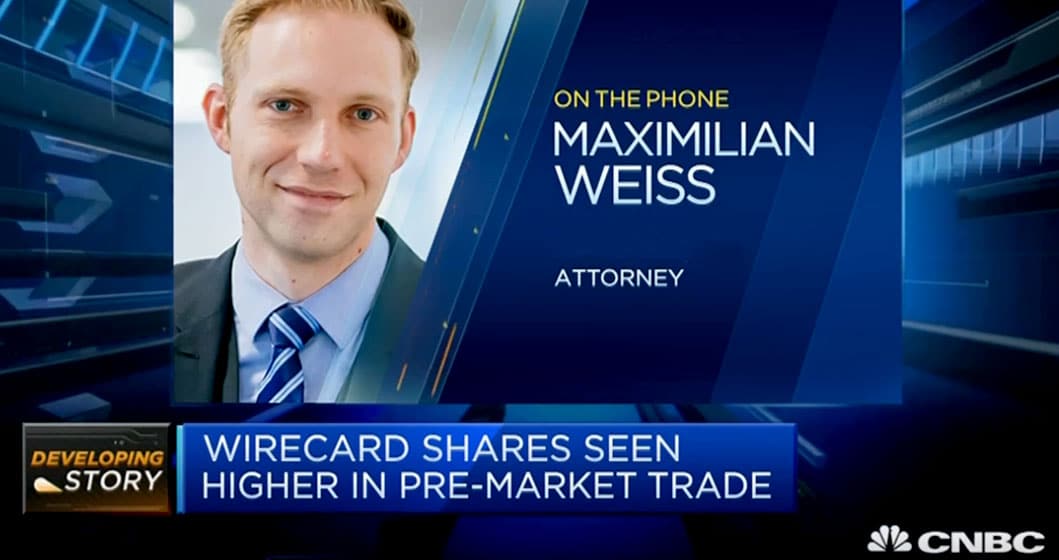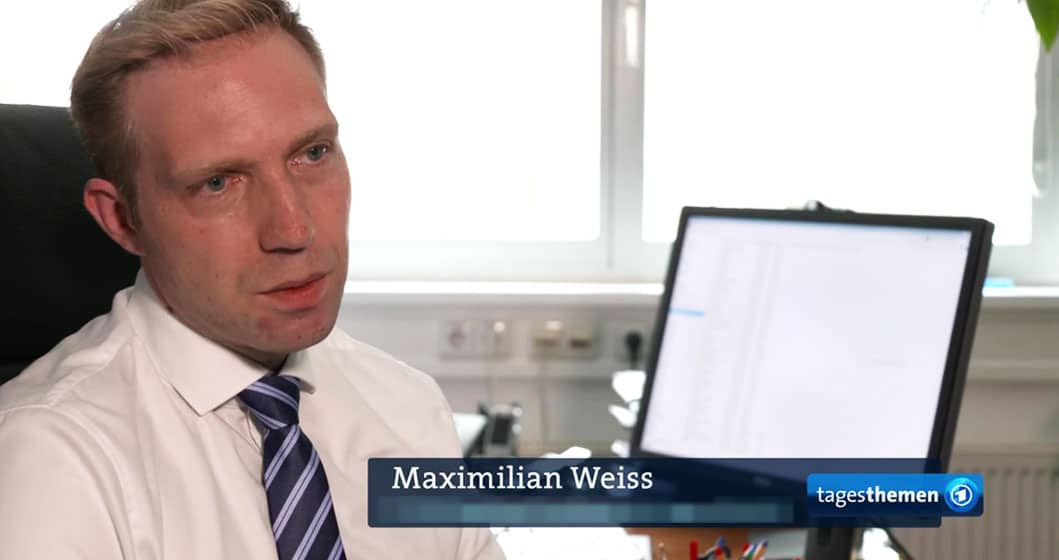Wirecard: Loss recovery for shareholders
Important: Legal action can only be taken until December 31, 2023. Investors should therefore check with WEISSWERT whether they are eligible and if valid claims exist. If so, we will be happy to represent you.
Everything investors need to know about the lawsuits and consolidated actions (known as a Sammelklage in German law) brought against EY and BaFin and about the Wirecard insolvency proceedings.
IMPORTANT: Stockholders who acquired Wirecard shares, particularly in the period from April 6th, 2016, up to and including June 18th, 2020 (10:43 a.m.), would be well advised to have their claims examined free of charge.
We are your experts when it comes to the Wirecard damage case
We will evaluate the various courses of action open to you, free of charge and without obligation.
Maximilian Weiss, LL.M.
Attorney | Managing Director
We at WEISSWERT are familiar with the Wirecard damage case down to its details since have played a lead role in addressing the legal ramifications of the Wirecard scandal:
It was attorney Maximilian Weiss – working at a different law firm at the time – who filed the very first investor lawsuit (pilot action) against Wirecard in Germany in the Spring of 2020, i.e. well before the balance sheet manipulations became publicly known. At the same time, Maximilian Weiss also applied for the initiation of model case proceedings under the Capital Markets Model Case Act (KapMuG). This suit later was extended to also target the auditing firm of Ernst & Young (EY). The plaintiffs submitted that Wirecard and EY had committed various breaches of duty under capital markets law and thus were liable to pay damages to stockholders. The charges specifically concerned the failure to publish various ad hoc disclosures as well as the publication of false and misleading capital market information.

WEISSWERT attorney Maximilian Weiss discussing the Wirecard matter on CNBC.
Developments since the Wirecard scandal came to light
While this pilot lawsuit set the legal review of the Wirecard accounting scandal in motion in Germany, much has happened in the meantime from an investor’s perspective. By now, the full extent of the balance sheet manipulations that occurred at Wirecard is well known. Given its disastrous financial position, Wirecard AG took the logical step of filing for insolvency with the Munich Regional Court on June 25th, 2020. Since then, a Bundestag Committee of Inquiry and several investigative reporters from Germany and abroad have performed impressive research and have brought new findings to light that are highly useful for investors. In particular, the evidence gathered with regard to malfeasance by Wirecard’s auditors is overwhelming. In addition, various court proceedings by now are in full swing and a number of decisions in the Wirecard damage case have been handed down by the courts. Especially the Higher Regional Court (OLG) Munich came into play and gave a precise instruction for the Regional Court how to deal with the investor claims – and very much in the sense of the aggrieved investors! And, last but not least, the requested model case proceedings for stockholders finally are taking shape and will be directed against the auditing firm Ernst & Young (EY) as the Munich I Regional Court has finally so-ordered (here you can find our WEISSWERT press release as of March 15, 2022 on this matter).
What all this means for you as an investor and stockholder and what you can do now to successfully recover damages is explained below.
First of all: In view of the ongoing insolvency proceedings, taking legal action against Wirecard AG itself is not a sensible option for aggrieved stockholders seeking to recover damages and thus is not advisable under any circumstances. On the other hand, filing claims in the Wirecard insolvency proceedings and taking legal action against the auditing firm of Ernst & Young (EY) may be a very sensible way for aggrieved stockholders to obtain (at least partial) compensation. Some investors also may consider asserting liability claims against investment advisors, financial intermediaries, and brokers in individual cases.

WEISSWERT attorney Maximilian Weiss discusses Wirecard in an interview on the German TV news program ARD Tagesthemen
Important to know: Deciding whether to assert your rights and claims as an investor/stockholder – and which of them specifically, in which way, and against whom – will depend on various factors. This makes it impossible to give a general opinion as to whether it would be worth your while to take legal action and, if so, which action exactly (or against whom). Thus, we would welcome the opportunity to review the courses of action available to you in your individual case.
To this end, we kindly ask you to register with us – free of charge and without obligation. In keeping with our firm’s mission, we will then provide you with a thorough and transparent explanation of the options open to you – again, free of charge. At the same time, we will recommend a personalized action plan while also informing you on further alternative ways to proceed in the Wirecard investor scandal. Of course, above and beyond the legal situation, we will also take the economic picture into account as well: As an aggrieved investor and stockholder, you should not only receive justice, but also what you are primarily interested in, and this is getting your money back!
What can aggrieved Wirecard stockholders do now?
In principle, stockholders have several options for obtaining compensation for their damages, which can be narrowed down to three main courses of action. However, we consider only two of these three main options to be fundamentally advisable for aggrieved investors as things currently stand. They are the following:
→ Filing claims in the insolvency proceedings of Wirecard AG;
as well as
→ Bringing legal action against EY (lawsuit or filing of claims in the model case proceedings).
“We will evaluate the various courses of action open to you, free of charge and without obligation.”
Maximilian Weiss, LL.M.
Attorney | Managing Director
Allow us to advise you free of charge on the options that reasonably could be considered in your case. Please use our contact form or call us. We have provided answers to frequently asked questions about the various viable courses of action below. Important note: As things currently stand, we expressly advise you not to bring legal action against the German Federal Financial Supervisory Authority (BaFin). Why we take this view – even before having had the chance to review your claims – is explained below as well.
Frequently asked questions regarding the Wirecard case
In our opinion, those specific stockholders of Wirecard AG who acquired Wirecard shares in the period from April 6th, 2016, until June 18th, 2020 (10:43 a.m.), enjoy recoverable claims for damages.
Yes. Particularly those investors will find a complaint well worth considering who acquired Wirecard financial instruments (shares of stock and bonds) in the period from April 6th, 2016 until June 18th, 2020 (10:43 a.m.). This is subject to certain provisos, however. We will be happy to advise you on the matter free of charge.
We firmly believe that bondholders also have recoverable claims, which is why they fundamentally should take legal action. Regrettably, the situation is different for purchasers of derivatives, however: In our legal opinion, they have very poor chances of recovering their money, either from EY or in the insolvency proceedings. Based on a cost-benefit analysis, we therefore expressly advise purchasers of derivatives not to pursue such claims. The prospects of success are too low and the costs too high to make pursuing such claims worthwhile.
In our firm opinion, Wirecard AG is liable for a whole slew of blatant violations of capital markets law. Legally speaking, we regard this to make matters quite clear: Wirecard is indeed liable. The rub, however, is that Wirecard AG, an insolvent enterprise, cannot even begin to pay for the total damage it caused to investors. This said, stockholders nonetheless may register their claims as part of the insolvency proceedings and thereby recover at least part of the losses. The achievable insolvency dividend could still range in the low double-digits, specifically based on the insolvency administrator’s report on the assets realizable (and already realized). Of course, the compensation recoverable by filing claims in the insolvency proceedings will be just “a drop in the bucket” for investors. Which is why it would be expedient to take legal action against liability defendants whose “pockets are deeper.”
Thus, in addition to Wirecard AG itself, we see Ernst & Young GmbH Wirtschaftsprüfungsgesellschaft (EY) as being primarily liable. In our firm opinion, higher recovery rates could be achieved by proceeding against EY. Where they are concerned, we assume that an overall settlement with the plaintiffs will be highly likely over time, given that this is a viable and expedient path to take – both for EY and for the plaintiffs. However, such a settlement most probably will only be reached after the relevant investor claims have expired under the statute of limitations. This would work to the advantage of EY in that the firm would have to settle only with those investors who became active before expiry of the limitation periods and who thus protected their claims from the time bar imposed by the statute of limitations. Simply put, then, EY stands to save money by waiting and delaying. And we are convinced that this in fact is the strategy they are pursuing. The bottom line for investors: You will have to take steps serving to extend the limitation period, for example by filing a lawsuit or by registering claims in the model case proceedings. Only then will you have a realistic chance of receiving compensation.
Q&A regarding the Model case proceedings against Ernst & Young (EY)
Yes. From a legal perspective, we see EY as having definite liability exposure. Only economic factors may make it unwise to take legal action in individual cases. Whether pursuing the matter is worthwhile in your specific case will depend, first of all, on your transaction details, i.e. the timing and amounts of your purchases and/or sales of Wirecard stock. It will also depend on how high your total loss is. In short: The quality of your claims and the amount of your total loss will be the determinative factors. Also, we will need to distinguish between different types of losses: The out-of-pocket damages (resulting from the difference between the price paid for a security and its hypothetical market value), and transaction-based losses on the other. We will review your case free of charge to determine whether taking legal action – and which type of action – is a worthwhile option for you. Please contact us!
Before you join a model case proceedings, you should first have us check whether it makes sense for you to participate in view of your individual situation. We will be happy to review your case free of charge. Write to us using the contact form, email us or call us. We will then send you further information on the options available to you.
Assuming our examination of your case finds that it would make sense for you to accede to the model case proceedings against EY, you basically will have two options to choose from: One is to file a lawsuit through us. Once the model case proceedings commences, you will then automatically become a “Beteiligter” (party) to the proceedings and inasmuch will participate in the model case proceedings together with other aggrieved investors. This will serve to suspend the period of limitations for your claims and you will benefit from any favorable judgment (model case ruling). Moreover, you fundamentally will be entitled to participate in any settlement of the model proceedings. And, more generally, you also will benefit from the fact that a large number of investors are joining forces to assert their rights. After all, there is strength in unity.
An alternative to filing a lawsuit is for investors to register their claims in the model case proceedings. It is true that such registration has disadvantages compared to filing a lawsuit. Thus, you will not be a party to the model case proceedings and inasmuch will not stand to benefit from the binding effect of a favorable model case ruling. On the other hand, registration is a very inexpensive process and, as with a lawsuit, it will allow you to interrupt the running of the statute of limitations regarding your claims. This may make registration a sensible option for many investors.
The order for reference to initiate the model proceedings has already been issued, ie the model case proceedings will begin soon. The Superior Court of Bavaria must now appoint a model case lead plaintiff. It is expected that the model case lead plaintiff will be determined in the course of 2022. The first oral hearing in the model case itself will not take place before the end of 2022, and probably not until 2023. However, deadlines must already be observed: Once the model case lead plaintiff has been determined, a period of 6 months begins within which investors can register their claims for the model proceedings at low cost. Therefore, you should register with us now, free of charge and without obligation, so that we can inform you about the progress and you do not miss the deadlines for filing your claims.
This requires extreme care to be exercised: In principle, you will have until the end of 2023, which is when your claims will become time-barred under the statute of limitations. But: There is a 6-month deadline for filing your claims in the model case proceedings; this cannot be extended and begins running once the model case plaintiff has been designated. Since particularly the registration of claims is an ideal, low-cost opportunity for many investors to benefit from the model case proceedings, we would advise you to register with us already now (free of charge). Because in that case, we will be able to notify you in a timely manner as to when the deadline is set to expire. Otherwise, you run the risk of missing out on this low-cost opportunity to register your claims in the model case proceedings.
That is difficult to say. We consider EY’s chances of defending itself successfully to be very slim. The evidence against them is simply too overwhelming. All things considered, we believe a settlement in 2024 to be realistic, especially since the interest payable by EY during the pendency of the action will lead to a continuous increase in its risks. The reason is that your claims will accrue interest (so-called “Prozesszinsen”) starting from the time you become active and file a lawsuit. This increases the pressure on EY to find a quick solution. That said, there certainly will be no compensation before 2023. Otherwise, this would send the message to all those investors who have not yet asserted their claims to do so ASAP. And the consequence for EY would be that they conjured up a wave of lawsuits from those who have so far failed to act, so that EY would then have to reach another settlement with these latecomers. As you can imagine, this would not be in EY’s interest. Rest assured that EY is well aware of the applicable mechanisms and is receiving competent advice from its lawyers. So under no circumstances will EY conclude a settlement before the end of 2023. Instead, it will refrain from signaling any willingness to settle until at least the end of 2023, continuing its current policy of vehemently denying its own liability by all possible means (also by way of using “litigation PR” to influence the media and public opinion).
The costs will depend on the amount in dispute and on whether you actually file a lawsuit or only register your claims for the model case proceedings. We will be happy to review your claims free of charge and to inform you of the costs that filing a lawsuit or registering in the proceedings would entail.
If you have legal expenses insurance, we also stand ready to obtain confirmation of coverage from the insurer on your behalf – again, free of charge. In this case, you will not bear any costs (apart from a possible deductible) and thus will run no risks.
In addition, we can offer litigation funding insofar as you require it. We will also review this possibility for you free of charge.
Yes. In our experience, legal expenses insurers will cover the costs of proceedings against EY without any problem, at any rate if your legal expenses policy provides coverage for disputes of this type. If you have a legal expenses insurance policy, we will be happy to ask your insurer to provide confirmation of coverage for you. In fact, it is advisable to have this done for you by a lawyer, since you will achieve the desired result in a more effective manner and expeditiously. To this end, we ask you to provide us with the name of your insurance company and your policy number. We will submit the request for confirmation of coverage on your behalf free of charge.
The term “Sammelklage” (consolidated action) is not really defined by German law. Strictly speaking, model case proceedings initiated by capital investors against EY under the Capital Markets Model Case Act (KapMuG) is not a consolidated action, in our understanding – at least not if the term “consolidated action” is taken to mean that several aggrieved parties jointly file a lawsuit. Likewise, model case proceedings under the KapMuG in no way are comparable to a class action lawsuit under the American model (which is based on an opt-out model).
In model case proceedings under the KapMuG, aggrieved investors indeed are jointly involved in the proceedings and inasmuch also assert their rights together and in one and the same proceedings. Before participating in model case proceedings, however, investors must file a conventional lawsuit of their own with the competent regional court. Only subsequently will the investors’ own action be suspended so that they can continue to litigate together with other investors in the model case. As you can see, this procedure does not have much in common with the generally understood concept of a consolidated action and even less with that of a class action. Nevertheless, model case proceedings under the KapMuG offer considerable advantages for investors and are an important building block for ensuring collective legal protection in Germany.
The short answer is “No.” EY’s liability is not limited in terms of the amount that investors can claim.
On the details: There has been some misreporting in the media – some of which still continues – concerning the limitation of EY’s liability. WEISSWERT lawyer Maximilian Weiss already has taken a stand on this in the media and explained the true factual situation. This is as follows: Yes, there is a statutory liability limit for auditors, which is capped at 4 million euros (see Section 323 of the Handelsgesetzbuch (HGB, German Commercial Code)). BUT: This limitation of liability only applies in relation to the audited enterprise and its affiliated companies, in this case the Wirecard Group. Here, it is the “internal” or “inter se” relationship (to use lawyers’ parlance) that is affected. This must be distinguished from the relationship to “external parties,” however: Thus, liability towards investors remains unaffected by the limitation of liability applicable in the internal relationship, i.e. by the limitation of liability stipulated by Section 323 of the Commercial Code. This means that EY cannot invoke this limitation of liability vis-à-vis investors. The statutory limitation of liability therefore plays no role when it comes to investor claims.
No. The correct opponent for the liability claim filed by aggrieved stockholders is
Ernst & Young GmbH Wirtschaftsprüfungsgesellschaft (EY) in Germany. The place of jurisdiction is situated in Germany. The foreign affiliated companies of the German EY branch are not conceivably liability defendants in the Wirecard case. This also eliminates the need for proceedings abroad.
Q&A regarding filing claims in insolvency proceedings and regarding BaFin
Yes. Filing claims in the insolvency proceedings is cost-effective and investors are also very likely to receive at least partial compensation. In particular, we firmly believe that aggrieved investors who acquired Wirecard financial instruments (specifically shares of stock) in the period from April 6th, 2016 until June 18th, 2020, are to be treated as creditors of equal rank alongside the unsecured lending banks. Based on the documentation provided to date by the insolvency administrator, we expect an insolvency dividend in the low double-digit percentage range. This would definitely constitute a successful outcome for insolvency proceedings of this kind. That said, higher levels of recovery should not to be expected unless other parties such as the auditing firm Ernst & Young are held liable as well.
In contrast to the registration of claims in model case proceedings, there is no requirement to have a lawyer file your claims in insolvency proceedings. Fundamentally, you may also file your claims yourself. Bear in mind, however, that your claims must be carefully substantiated. The requirements for this are complex, especially in the Wirecard case. Not only must you present the damage suffered (out-of-pocket damages (resulting from the difference between the price paid for a security and its hypothetical market value) and transaction-based losses), you will also have to substantiate the facts of the case. We therefore strongly recommend that you hire a lawyer to ensure that your claims are actually recognized by the insolvency administrator.
WEISSWERT will register investor claims at a reasonable price on the basis of the Rechtsanwaltsvergütungsgesetz (RVG, Act on the Remuneration of Attorneys). Since the actual costs incurred will depend on the damages you have specifically suffered, we offer to prepare a preliminary calculation of your claim free of charge. Subsequently, we will be happy to inform you of the actual costs you will incur on this basis. Please contact us!
We are of the opinion that Bundesanstalt für Finanzdienstleistungsaufsicht (BaFin, Federal Financial Supervisory Authority) indeed is liable for having misused its power in the Wirecard scandal vis-à-vis investors who acquired Wirecard financial instruments in the period from February 18th, 2019 until June 18th, 2020. Please note that this period is not identical to the period within which we consider EY to bear liability for the acquisition of Wirecard financial instruments.
Nevertheless, our advice to investors in view of the present situation is not to take legal action against BaFin, and instead to await further developments. Taking action against BaFin would be fraught with enormous risks. In a number of other legal proceedings against BaFin – ones not handled by our law firm – the plaintiffs’ claims were dispatched without ceremony. So at present, this would not be a promising avenue for investors to pursue. Our plan, therefore, is not so much to file a lawsuit against BaFin together with a broad mass of investors, but to set the right course instead by initiating a pilot case that would pave the way for potentially filing suit on behalf of additional aggrieved investors at a later point in time – and that only if there is a sufficient chance of success. You are welcome to register with us free of charge. We will keep you up to date on the progress made.
Register now for your cost free review!
Explore your options and protect your rights. You can find out from WEISSWERT, free of charge, if you are eligible to claim compensation. If you have a claim, we will also provide you with our recommendation and with further available options on what measures can be taken. This service is free of charge.
headlines
FIND OUT MORE ABOUT OUR CURRENT CASES
With a pioneering spirit and highly focused expertise, we are passionate about effectively asserting the rights and protecting the assets of the investors and bank clients we represent.
Whatever we do, our goal is to achieve the best possible economic result for our clients, and to do so expeditiously and cost-effectively.
Maximilian Weiss, LL.M.
Attorney | Managing Director



